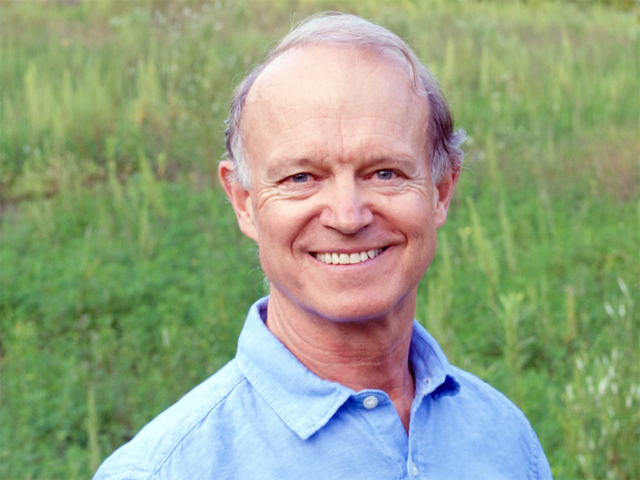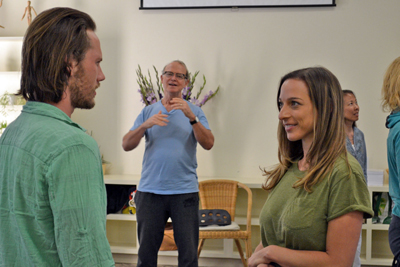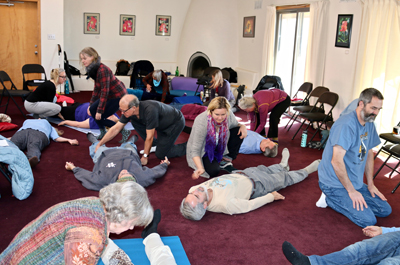Philip Shepherd The Embodied Present Process Interview

The Break-Through Practice
Through our upbringing, we are taught to lead with our minds – to think, evaluate and even move – and that our brain can drive thought, behaviour and life's outcomes. However, there is a largely untapped asset that can open-up a new bout of intelligence and understanding.
The Embodied Present Process™ (TEPP), is a new ground-breaking set of practices originated by Philip Shepherd that seeks to reunite the intelligence of the head with that of the body. It teaches us how to be truly 'in the moment' and better connected with the world, ourselves and each other. His work draws on a lifetime of research and adventure from his teenage years through Europe, the Middle East, Iran, India and Japan.
The practice explores the two 'brains' we have in our possession – the head and one deep in the belly. Each providing valuable strengths. Philip's work is about bringing these two poles into unison, so they can work together.
Accessing and attuning to the body's intelligence (our centre of feeling) and reconnecting the mind and body, can completely change the way we experience our world. TEPP differs from meditation, yoga, mindfulness which still tend to be 'head led' – it teaches people how to be present and connected to the world.
This practice addresses the all too common experiences of people feeling a little disconnected, distant, anxious or confused at times with modern life. The body provides a valuable bridge to the world – and through TEPP people can:
• learn to calm hyperactive or negative thoughts
• attune to the present through the body which is empowering and feels amazing
• begin to live their true purpose, as they reconnect and can feel what that is
• experience all their relationships flourish in a way that seemed distant before
TEPP is suitable for anyone wishing a more connected experience: artists, bodyworkers, therapists, public speakers or hosts, yoga practitioners, athletes, spiritual seekers and business leaders have all benefited from the practices of TEPP.
www.tepp.life

Interview with Philip Shepherd, The Embodied Present Process International Founder
Question: Can you tell us about the ground-breaking new wellbeing practice you're launching, here?
Philip Shepherd: Ground-breaking is a good word because people walk around feeling frustrated, disconnected and anxious which leaves them asking "what's wrong with me?" I have found that it's not an individual problem but a cultural problem. Our culture instructs us, from the time we are infants, into what it means to be human and how to live on this earth; the instructions we take into our psyche lead to disconnected, anxiety and a whole range of turmoil that leaves us with a sense of unfulfillment.
My work addresses how we've been conditioned to see the world and respond in judging ourselves; once you begin to liberate yourself from that, everything changes!
Question: Is this a disconnect between our head and our body?
Philip Shepherd: Yes, that's the source; funnily we take that to be normal because that is normal in our culture but other cultures think it's bizarre! What we've been led to believe is that you can think more clearly if you shut off the sensations of the body and live your head. Neuroscience has discovered that the body processes a billion times more information than we can be consciously aware of. We are trying to live our lives, drive our relationships and careers with a disconnected fragment of our intelligence which causes the issue of not being able to soften out of the head into the realm of intelligence that lives through the body.
Question: What is the Embodied Present Process?
Philip Shepherd: There are so many approaches to offer through the Embodied Present Process as there are so many ways in which we've been conditioned. A large part of the process has to do with the breath, we know the breath is important and breathing deeply into the body is important however our culture has turned breathing into a top-down operation; we push the breath from the top down into the body which takes muscle and the muscles get tired causing the breath to become shallow. We need to look at how a baby breathes: a baby just releases the whole of its body to the breath. The work begins with understanding that you don't need to 'do' the breath, you don't need to 'muscle' the breath, you just need to bring your awareness into the depths of the body to release the in breath and release the out breath. With one simple change everything else will begin to adjust.
Question: Does this practice encourage avoiding multi-tasking?
Philip Shepherd: It's not necessarily where my work tends to go as I'd be a hypocrite if I condemned multi-tasking as I fall into it myself. We are used to living in our head and making decisions and taking charge from our head however there is another realm of intelligence that provides guidance in the present. It may sound strange but the present has fields that convey information and we have a living relationship with the present that we lose track of when we close off into our heads and dull the body. The body most profoundly understands that it belongs to the world and as we begin to heal that relationship we are no longer stuck in the head trying to figure it out but we move into an ease of finding guidance in the world.
You will have experienced that the body just has a sense of knowing with no ambiguity, you just know and move forward with the knowledge – it's clarity of being that we settle into and allow us to reclaim our ability to use the bodies intelligence.
 Question: How can Australians find out more about the Embodied Present Process?
Question: How can Australians find out more about the Embodied Present Process?
Philip Shepherd: My website https://philipshepherd.com/ offers a list of readings, workshops and I will return to Australia in February and March of 2020.
I also have launched an online course, available at www.tepp.life. The newly offered course is designed to take someone step by step back into the intelligence of the body; which brings them back into relationship with the world and the sense of connecting and fretfulness and anxiety can begin to soften and then dissipate.
Question: What is the timeframe for a student to learn this practice?
Philip Shepherd: It would start with the very first exercise, there are four exercises and each exercise is completed over a week. Each week explains why we are doing the exercise, for example: in our culture we are told that we are independent from the world which is a fantasy, there is no such thing in our world as independent, everything is affected by everything and depends on everything. The context of the exercise sets up the exploration of the practice.
Over the course of a week before the next exercise arrives students will practice. My practices belong in your life and are to belong whilst you're washing the dishes, talking to a friend or shopping at the grocery store. I encourage students to take the practices into their daily lives; you don't need to seclude yourself for twenty minutes, a day.
Interview by Brooke Hunter
MORE



